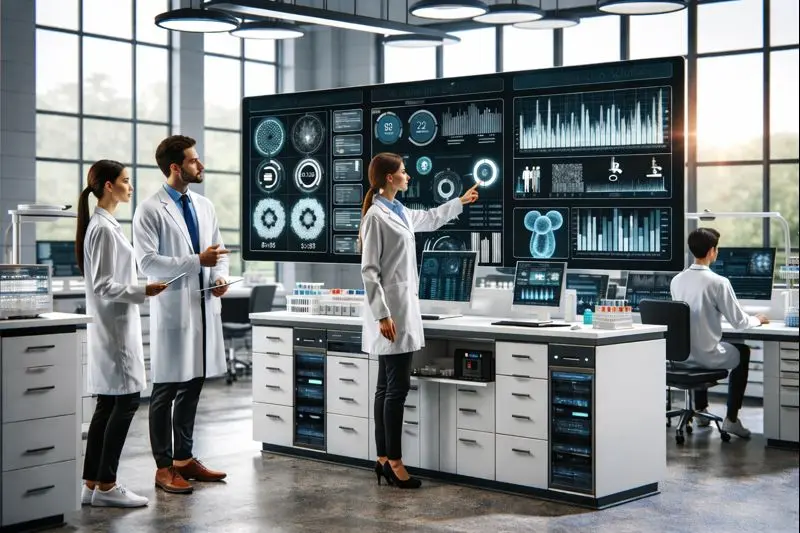Blog
The Best Laboratory Information Systems: LIS Software Solutions for Clinical and Pathology Labs
October 30, 2025
Every medical laboratory - anatomical, clinical, or reference - wants to grow and thrive even though the goal is easily hindered by outdated and non-integrated laboratory information systems (LIS systems) that fail to meet the needs and challenges of rapidly evolving laboratory environments.
LIS Meaning Medical: What is LIS in Healthcare?
A lab information system is a pathology lab reporting software that has become integral for the informatics infrastructure of advanced healthcare systems, busy medical laboratories, and hospitals. Although most commonly known as laboratory information system/LIS software, it’s sometimes referenced as a healthcare LIS or medical LIS.
Inside labs, the laboratory information system manages and organizes the flow of medical data, including various lab processes, such as recording, updating, and storing patient-related data. It also supports sample tracking and reports management.
LigoLab Informatics Platform offers comprehensive and enterprise-grade pathology lab software. The cornerstone of the platform is its LIS laboratory information system module designed to improve laboratory processes and data management for pathology groups, clinical laboratories, and molecular diagnostics laboratories.
Learn More: The Power of Laboratory Information Systems (LIS) in Healthcare
How Does LigoLab’s LIS Medical Solution Work?
LigoLab’s LIS system software is a pathology lab management system that comprehensively manages a laboratory’s data needs by connecting and integrating all departments and lab processes into one united pathology software infrastructure with a shared database.
This removes the dreaded information silos that result from two disparate laboratory software systems (for instance, data sharing between a medical LIS and laboratory billing software requires constant synchronization and is prone to errors) and ensures data integrity for all clinical lab workflow and every lab department, thereby enabling medical laboratories and pathology groups to operate more efficiently and provide better service to its clients and their patients through enhanced laboratory workflow management.
Learn More: Best Pathology Lab Reporting Software - Buyers Guide and Checklist
How Do Modern Laboratory Information Systems Differ from Legacy LIS Systems?
Legacy pathology LIS systems often lack the flexibility, automation, and interoperability to fully support technical operations, improve patient outcomes, expand lab testing services, and increase net collections for independent laboratories. Common LIS system software problems that create pain points and prevent scalable growth include:
- Issues with reliability and performance
- Insufficient functionality (lacking LIS system modules and features)
- Lack of scalability (the LIS pathology solution can’t keep up with demand)
- Not flexible (requires external LIS vendors for configurations)
- Legacy lab information system report formats and delivery options that are unable to cater to customer needs
- Inefficient clinical lab workflow and time-consuming manual processes
- Sample handling and sample tracking workflow that lacks a robust chain of custody, uniquely barcoded samples, plus verification and security check-points
- Accessing LIS software information on processes, bottlenecks, and compliance is difficult
- Intradepartmental and external (EMR/EHR, APIs, instruments, state registries, billing services) prevents seamless interoperability
Industry Insights: Why Replace Your Laboratory Information System Now?

Is Laboratory Information System (LIS) and Lab Information Management System Software Essentially the Same?
A laboratory information management system (lab LIMS) typically serves non-clinical environments (such as research laboratories). Designed to handle large, complex datasets in industrial settings, lab LIMS software supports operations, maintenance, and product development decisions.
A lab LIMS can be more expensive and complex to configure, with each system subject to different regulatory requirements. On the other hand, laboratory information systems are exclusively designed for clinical settings.
Laboratory information systems are custom-designed for the medical lab environment and patient care. For example, with LigoLab’s LIS software solutions, healthcare users enjoy a future-ready and scalable informatics platform that’s infinitely configurable to meet customer requirements, no matter the size or type of medical lab.
Laboratory information system software can quickly be adapted to add more physicians and personnel, interfaces, and services as operations scale. Users benefit from improved operational LIS lab workflow, reduced labor costs, and increased revenue and profit by:
- Managing all departments and operations on one unified medical LIS system software with no data silos
- Automating complex processes and reducing manual entry touchpoints
- Expanding services and acquiring new business
- Maximizing interoperability and efficiency with other laboratory software systems
- Eliminating human errors and lost specimens by embedding automation and quality assurance protocols in all clinical lab workflow
- Producing fully customizable reports
- Providing multiple options for report delivery
- Monitoring quality control to identify, troubleshoot, and resolve problems quickly
- Improving lab testing turnaround times
- Obtaining easily accessible business analytics (dashboards, stats, dynamic reports) from every department in real-time
Additionally, when paired with LigoLab’s laboratory billing solutions, laboratories gain the ability to start the laboratory billing process (lab revenue cycle management) at order inception with the support of verification, eligibility, and scrubbing components that increase clean claim submissions, revenue, and accounts receivables, and decrease claim denials and compliance risk.
Learn More: Six Reasons Why You Should Choose an Integrated Laboratory Billing Solution for Your Medical Lab
Upgrade and Enhance Critical Areas with LigoLab’s LIS System Software
From accessioning to specimen handling and tracking, and reporting to collections, the LigoLab Informatics Platform supports all laboratory information system and laboratory revenue cycle management (RCM cycle) processes at every stage.
Real-Time LIS System Order Validation
LigoLab’s all-in-one medical LIS and lab billing platform has access to all the accurate information needed for a smooth and productive lab billing workflow at order entry.
That’s where data verification and scrubbing components are shared by the LIS system and lab revenue cycle management modules - and real-time RCM tools like patient and payer data verification, insurance coverage lookup, and eligibility confirmation are seamlessly integrated into a live queue-facilitated lab workflow. This provides a high level of transparency and prevents claim rejections and denials. The fully integrated laboratory information system functions include:
- Demographic check, address validation, insurance discovery, and eligibility verification at order inception
- Bidirectional synchronization with third-party services (mailing companies, clearinghouses, NPI Registry, payment processors)
- Automated ICD and CPT coding and TC/PC splitting
- Real-time data processing lab workflow queues for heightened visibility
- Detailed statistical reports to monitor trends and KPIs
Additionally, LigoLab supports the clinical laboratory management of client contracts by providing extensive functionality and customization for client lab billing, including unlimited fee schedules, discounting, special pricing, capitation, incremental pricing, and automatic travel and transportation pricing.
Lab Sample Management System and Patient Safety
Error-free lab sample management is vital for all medical laboratories and should be expected from any modern lab information system.
The LigoLab platform assigns each specimen a unique identifier, ensuring the chain of custody and security of the specimen while virtually eliminating lost or misplaced orders by:
- Integration with all barcode printing and etching hardware
- Automatic generation of a unique identifier for every specimen and document
- Full traceability of specimens with an awareness of the next step in the lab workflow
- Users can track the beginning and end times for processing
- Automatic detection of duplicate patient profiles at order entry
Learn More: How Specimen Tracking Software Improves Efficiency and Reduces the Chance for Diagnostic Errors

Highly Customizable Lab Information System Reports
LigoLab’s medical laboratory information system solutions enable users to create fully customizable and intelligent lab reports with the platform’s high-performance reporting and distribution engines that feature rule-based formatting and uniform presentation.
The report generation engine supports full rich-text capability (format, size, colors, highlights, tables, bullet points, etc.), images, diagrams, annotation, macros, conditional rules, dictation to text, and CAP cancer protocol templates.
The distribution engine automates the delivery of lab reports based on the customer’s preference. Delivery options include a provider portal, outreach software, EHR, fax, secure email, in-house printing, PDF drops, APIs, IVR, SMS, and remote print server.
- Standardized report structure based on industry trends
- Custom template format for client satisfaction and co-branding
- Integrated reports for time-saving efficiency
- Cumulative reports for patient safety and continuity
- Automated distribution based on customer preference
Learn More: Streamline Laboratory Workflow Management With Customized Lab Reports & Unmatched Client Support
Remote LIS System Access for Orders and Results Retrieval
Medical practitioners and laboratory specialists can leverage the LigoLab Connect or Web Connect features for remote interaction between the client and the laboratory.
Users can receive and search for reports, pull cumulative charts, fax out of the LIS system software, and gain access to all patient-related scanned documents.
- The LigoLab Connect application is free and easy to install with an unlimited license for downloads
- It’s a secure internet application launched from a desktop
LigoLab Web Connect is what it sounds like - a web version of the outreach software application that doesn’t require a software installation. It’s available to customers who license the Professional, Advanced, or Enterprise licensing tiers (learn more about all four tiers HERE).
LigoLab Connect and Web Connect are extensions of the medical LIS and the lab that create new business opportunities.
- No third-party outreach or middleware software needed
- It can be laboratory-branded with company logos and other branding elements
- Reduces incoming customer service calls with self-service tools for inventory management and access to scanned documents
Learn More: LigoLab’s Provider Portal Facilitates Faster Order Processing and Improved Turnaround Times
TestDirectly Direct-to-Consumer Lab Testing Portal
The TestDirectly Direct-to-Consumer Lab Testing Portal (TestDirectly.com) removes manual order entry and follow-up bottlenecks with a streamlined digital lab workflow for direct patient specimen collection, lab testing, and reporting. It boosts testing capacity and improves turnaround times while fully supporting direct-to-consumer labs.
- Integration with all LIS systems and laboratory billing solutions resulting in efficient laboratory workflow management reporting
- Increased testing accessibility that opens new revenue streams
- The patient self-registers and schedules the collection appointment
- Support for real-time insurance eligibility checks
- Specimen barcoding and sample tracking support
- Report delivery via email, SMS, portal, or interface
- Automated result notification for patients via email and SMS
- Real-time results and analytics for the patient, provider, and all other stakeholders
- Support for all direct-to-consumer lab testing collection workflows including at-home collections
Learn More: Highlighting the Versatility of the TestDirectly Direct-to-Consumer Lab Testing Portal

Maximum Laboratory Information System Interoperability
The LigoLab platform features an open architecture and a best-in-class interface engine that functions with maximum interoperability, enabling LigoLab’s LIS pathology software to connect to a majority of analyzers (over 500 different instrument types), EMRs/EHRs (connected with every certified Electronic Medical Record and Electronic Health Record to date), and third-party services with ease.
This includes internal networking (medical LIS/lab RCM) as well as connections with external networks of healthcare organizations, such as lab billing services, the Tumor Registry, and state reporting agencies.
LigoLab’s versatile interface engine supports all standard interchange protocols, including FHIR, HL7, XML, X12, CSV, PDF, Flat File, ASTM, and Restful API.
Automate Complex Processes and Reduce Human Intervention with Advanced LIS Software Solutions
The highly skilled engineers at LigoLab have designed a rule engine for the LIS system that substitutes inefficient and manual laboratory processes with conditional rules and automated actions that can be built without custom scripts and fire when certain logical conditions are met.
These rules and actions are then strung together as decision-support trees by the LIS system’s automation engine.
- An agile lab information system platform that automates laboratory processes so that staff may be reassigned to more productive roles
- High-visibility and real-time clinical lab workflow queues for data
- Flexible rule engine for optimal LIS system and lab billing automation
- Multi-layered laboratory workflow management control
On-Demand Webinar: Leverage LIS System Rules, Automation, and Data Analytics to Increase Efficiency and Cut Costs
Regulatory Compliance That’s Not Labor-Intensive
To minimize compliance risk, LigoLab offers a variety of specialized laboratory information system tools that reduce audit risk and potential revenue loss without being labor-intensive.
Users can effectively operate within the guidelines of CAP, CLIA, HIPAA, and other regulatory bodies to mitigate compliance concerns and avoid penalties.
- Compliance-conscious clinical lab workflow and reports
- Ad hoc data query capabilities
- Support for all established regulatory protocols
- Compliance verification at every stage
Learn More: A Detailed Look at How Modern Laboratory Information Systems Fully Support Quality Control
A Safe and Secure LIS System Platform
LigoLab offers advanced security and privacy features that protect the laboratory and its patient and specimen data, giving customers peace of mind in an era of heightened cyberattacks on healthcare.
- Automatic log-off for user inactivity
- A robust and searchable audit trail that logs every activity
- User permission and visibility control
Learn More: LigoLab’s Enhanced Cybersecurity Solutions Give Customers Added Protection and Peace of Mind

Comprehensive and Flexible Laboratory Information System Software for Your Lab
Dealing with multiple lab vendors, laboratory software systems, middleware, and interfaces in your environment is more than just frustrating, it’s costly. These legacy arrangements lead to information silos, inconsistent data, inefficient laboratory workflow management, and ultimately less profitability.
Fortunately, there is a cost-effective alternative for lab operators tired of the finger-pointing - decision-makers who understand how an end-to-end laboratory information system software that covers all laboratory departments can be a game-changer for their operations and finances.
As a comprehensive and enterprise-grade lab pathology software, the LigoLab LIS & RCM Laboratory Informatics Platform™ includes modules for anatomic pathology, clinical laboratory, molecular diagnostics, laboratory billing (lab RCM), and direct-to-consumer lab testing (TestDirectly and TestDirectly.com), all on a single integrated infrastructure that’s infinitely configurable and supports every department, role, and case.
Learn More: What You Need to Know Before Contracting with a Laboratory Information System (LIS) Company
Still not sure if LigoLab’s LIS software solutions fit your lab’s business goals? The next step is to start a conversation with a LigoLab product specialist to get your immediate questions answered.
Speak with a LigoLab Product Specialist!






